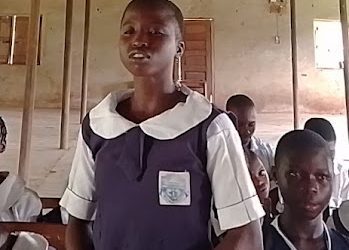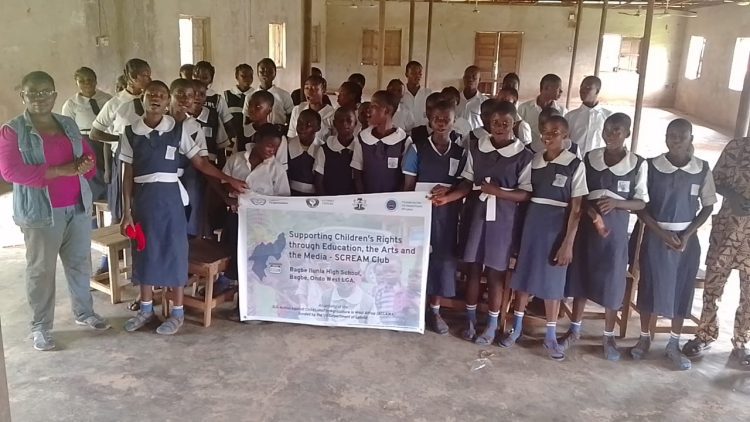The sleepy communities of Bolorunduro, Fagbo, Igushin, and Bagbe in Ondo East and the West Local Government had the largest cocoa-producing capacity in Ondo state. Due to the economic situation and the challenges of affording labourers to work on cocoa farms, most farmers employed boys and girls as labourers on their farms at a stipend.
When the reporter visited the Igushin farmstead around ten o’clock on Thursday morning, she met three girls of the same parent: Nine-year-old Serifat Raheem, 13-year-old Raheem Rasheedat, and 16-year-old Lateefat Raheem, in the cocoa farm while other children were in school.
Their mother, a widow in her late40s, Ms Iyanuoluwa Raheem, stated that to meet the family’s needs, she most often takes the children to work on cocoa farms so they can get a stipend for feeding. She explained that she had been the primary breadwinner due to her husband’s demise.
“The economy is so harsh now that the produce from my cocoa farm can’t feed my family. I lost my husband years ago and have been catering to the needs of the children.
“So most of the time, to augment what I make on my cocoa farm, I take my children with me to work on people’s farms, and we get paid. Ordinarily, I hire labourers, but they charge N4000 daily. However, I collect N2000 because my children assist me on the farm, making the work faster.”
Raheem Rasheedat and Raheem Serifat also said they help farmers produce palm oil to pack the palm fruit, and they are paid N1000 daily, while they help cocoa farmers pack cocoa pods at a token.

This is the plight of boys and girls trapped in child labour in Ondo East and West local government areas of Ondo state.
While on the assessment tour of the farms, the reporter met a group of farmers preparing palm oil using the local method: Adijatu Usman and Akinmutimi Moturayo, who were working on palm oil fruit. They also confirmed using minors for farming.
“Our children usually assist us because the charges from labourers are too exorbitant, and when our children are in school, some children Laborers assist us, and we pay them a token of N1000, N1500 per day from 6 a.m. to 6 p.m,” Adijatu Usman said.
They believe education is the best legacy to give a child, but due to the huge sum charged by labourers on their farms, most cocoa farmers engage the services of children and child labourers in the fumigation, cocoa pudding, and packing.
Like the Raheems, 13-year-old Damilola Elewe, a student of Igushin Community Grammar School, assists her father whenever he is working on people’s farms.
“I assist my father on the cocoa farms because if I don’t go with him to the farm, there is no way of feeding the family and paying my school bills,” 13-year-old Elewe Damilola said. “Anytime I helped them fumigate the cocoa, I had a lot of itches on my body and a kind of peppering feeling in my eye.

According to National Bureau of Statistics data, 52.6% of children in Ondo West engaged in hazardous cocoa farming work, often for minimal pay or assisting their parents. Similarly, in Ondo state, 57.4% of those aged 5-14 skip school for cocoa farms.
Students who spoke with BONews with the consent of their teachers and parents report that the boys are saddled with the responsibility of fumigation while girls pod the cocoa and pack it out of the farms. They also confirmed that they work as labourers to earn additional money.
19-year-old Adetinoye Tobi was sighted in one of the farms packing palm fruit seedlings. When questioned why he was not in school, he stated that he was on the farm to work as a labourer, packing palm fruits and clearing the cocoa farm.

13-year-old Adio Balikis and 13-year-old Awoyemi Emmanuel of Bagbe Ilu Nla High School also said that they worked as labourers to fumigate the cocoa with chemicals against pesticides to earn money. So were the stories of other students in the schools visited who recounted their experiences on the hazardous work they engaged in to earn a living.

Speaking about the state of absenteeism in schools and how children engage in labour work, Mr. Adejana Isaac, a teacher at Igushin Community Grammar School, said,
“During the dry season when there is no harvesting of cocoa, students are always in school, but during the cocoa harvesting period, about 80% of students are always absent.”
In all the communities visited by the reporter, schools are a shadow of themselves due to poor access roads and poor infrastructure. The schools lacked essential facilities like laboratories and libraries.
Also, during the reporter’s visit to the farmsteads in the four communities in Ondo East and West, one major challenge in accessing the farms was the dangerous and poor road network. It rained a day before the reporter’s visit, and the roads were largely inaccessible to road users, especially motorcyclists. The reporter fell in the mud on her way, which indicates some of the challenges the labourers regularly encounter in accessing the farmlands.

“The roads are bad, the pests are destroying our cocoa, the chemicals we use are expensive, and most of the time after harvest, moving the goods is challenging. That’s why we often engaged children in labour work to maximize profit,” Ariyo Benjamin, a cocoa farmer who rented his farm for a year, said.

According to Ariyo, labourers are paid N4000 Naira per day and N350,000 per year, unlike before when it was cheaper and the climate challenges were not as challenging as they are now.
The Alara of Igunshin land, Oba Lawrence Adelaisoye, expressed frustration with climate challenges affecting cocoa production and the huge sums of money charged by labourers, which are pushing farmers to engage children in their farms.

“Our farmers are suffering, the road to our farms has been destroyed by flood, and the poor road network has made the charges from labourers very exorbitant.
“We send our children to school, but we don’t allow them to go to the farm on school days because the ILO Acclawa project and some NGOs were in the community to sensitize the farmers on the danger of child labour, and we have stopped doing that,” Oba Adelaisoye said.
Baale of Bagbe and Bolorunduro also shared their thoughts about how rural communities have been suffering from neglect in the area of infrastructure development, and the only thing they have is their family to assist them in their work.
They said their farmers produced large quantities of cocoa and kola nuts for local and international buyers.
Legal Rights of Children and The Child Rights Act In Ondo State
The Ondo State Child Rights Act, passed into law in 2007, protects the rights and privileges of children aged 0 to 16. The law stipulates that a child has the right to survival and development.
In an interview with a human rights lawyer in Akure, Barrister Debbie Sagba said the Ondo State Child Rights Law 2007 stipulates that no child shall be subjected to any forced or exploitative labour.
“It is against the law for a child to work in any capacity as a labourer except where he or she is employed by a member of his or her family on light work of an agricultural, horticultural, or domestic character,” Barrister Sagba said.
“Anyone who contravenes any provision of subsection 21, (1,2 ) of the section commits an offence and is liable on conviction to a fine not exceeding N50,000 or imprisonment for a term of five years or to both such fine and imprisonment,” she said.
Similarly, Barrister Bolanle Afolabi, Executive secretary of Ondo State Agency Against Gender-Based Violence, OSSA GBV, stated that the Violence Against Person Prohibition law was signed by the late Governor Oluwarotimi Akeredolu to protect the rights of every citizen.
A UK-based non-governmental organization, the Westminster Foundation for Democracy, was also in the state to partner with the government to amplify the law and educate stakeholders on its implementation.
The Child Rights Act was passed into law in 2007 to protect children’s rights and provide a safe space for them.
“Children are not to engage in child labour, especially when they are minors and not up to 18 years. Children should be cared for, not caring for themselves. They have rights to education and adequate care as provided by the law. There are penalties for abusing a child because every child has the right to education and a decent life,” Barrister Bola Afolabi.
She said that in situations like this when children are caught in child labour, such children are withdrawn and placed in a government shelter for them to have their sanity.
Efforts to Discourage Child Labourers: Community, Government and Civil Society Organisation Interventions
In some schools in Ondo West and East, the Scream Club was established with the support of the International Labor Organization Aclawa project, which supports children’s education, arts, and the media.
In Bolorunduro, Bagbe, and Igushin communities, the teachers in charge of the scream club stated that the club’s establishment had assisted the students in understanding the dangers of child labour and engaging children in hazardous work.

“Before the establishment of the streaming club, during the school period, some of them used to be absent following their parents to the farm, but the club had influenced them positively, there are still records of absentees, but it’s reducing day by day. We need the attention of the government in the schools. The heavy rainfall has affected most of the school facilities,” Adejana Isaac said.
The Federal Ministry of Labour and Employment has also tried to reduce child labour through various interventions.
The controller of the Federal Ministry of Labor and Employment, Ondo state, Ms Olanike Mogboruko, said that the state task force set up to educate and advocate against child labour was always engaging with farmers in the flashpoint areas.
“The state steering committee against child labour had embarked on various sensitization to rural communities in Ondo state, and when cases of child labour are detected, we intervene. If the children are not safe to continue to be in the custody of their parents or guardian, the women affairs in the state take charge of their welfare,” Mogboruko said.
She also noted that the media is key in exposing child labour in these rural communities, and that’s why ILO Acclawa is in Ondo state to engage the media and CSOs in addressing the issues.
Similarly, Save the Children International (SCI), a UK charity organization, is implementing a three-year project to eradicate child labour in Ondo.
Murjanatu Kabir, SCI’s Advocacy, Campaigns, and Policy Manager on Social Protection, said the Ondo East and West communities were selected for the pilot project because of the prevalence of child labour in Agriculture.
“We are still expanding to other local governments, but there is a high prevalence of child labour based on our Ondo East and West data. We are forming a coalition with media and CSOs to also assist in educating the parents and farmers on the dangers of engaging children in hazardous work and denying them education,” Kabir said.
Kabir emphasized the need to implement the Child Rights Act and Violence Against Persons Prohibition Act and educate farmers on the implications of their actions regarding child labour.
This report was produced with support by the Civic Media Lab

